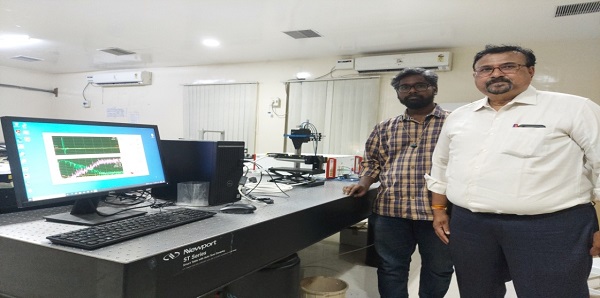Hyderabad, (Samajweekly) A research team at the University of Hyderabad (UoH) has designed and developed an indigenous Terahertz (THz) pulsed imaging system capable of detecting and identifying concealed metallic, explosives and drugs samples within a paper envelope.
THz imaging technique acts as a perfect tool for the detection of concealed (hidden) metallic objects like arms and ammunition which may be potential threats, thus making it a suitable tool for defence and homeland security applications.
THz radiation also known as T-ray lies between the microwave (electronics) and optical region of the electromagnetic spectrum which is extended between 100 GHz to 10 THz frequency or 3 mm to 30 micrometre wavelength range.
The research team led by A.K. Chaudhary and P. Naveen Kumar (senior research scholar), ACRHEM, School of Physics, University of Hyderabad, achieved success in designing and developing an indigenous THz pulsed imaging systems between 0.1 to 2.0 THz range.
The system provides five numbers of real time images of the given object.
“We have used an optical fibre-coupled femtosecond laser, a voice coil-driven corner mirror with a position sensor and InGaAs/InAlAs photoconductive antennas for THz generation and detection,” Chaudhary said. The work has also been published in the March 2023 issue of In.J. of Physics.
THz radiation has the capability to interrogate a wide variety of materials such as semiconductors, gases, polymers, pharmaceutical drugs, chemical mixtures, biological and environment pollutants and helped in determining the optical properties of many dielectrics and non-metallic materials.
THz ray can penetrate through most of the non-metallic materials such as plastic, paper, wood, rubber and ceramics which are opaque in the visible and infrared region.
One of the major applications of THz spectroscopy and imaging is in non-invasive detection of materials composition and retrieval of complex surface topography of objects in the form of 2D/3D hyper spectral images.
THz-TDS imaging can be carried in transmission and reflection geometries. In transmission geometry, the temporal profile of the electric field transmitted through the investigated sample is measured and compared with a reference spectrum obtained from the free path.
However, many samples possess significantly high absorption properties in the THz range or are highly reflective situations that limit or completely impede the use of THz imaging in transmission geometry.
The project is funded by the DRDO, Ministry of Defence, Indian government, ACRHEM-Phase-3.










